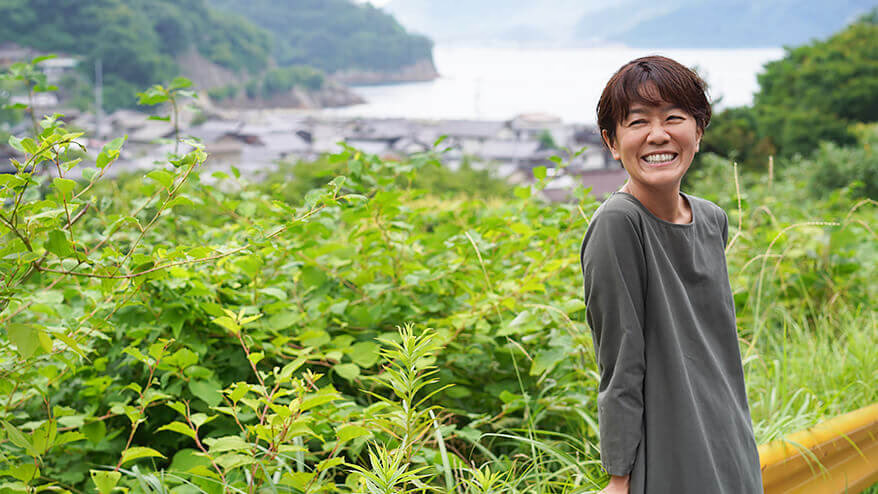こんにちは。ものさすサイト事務局の杉本です。
ふだんは、京都で暮らしながらライターの仕事をしています。
今回は、ずっとインタビューしてみたかった副社長の永井さんに会うために、瀬戸内海を渡って周防大島のサテライトオフィスを訪ねました。永井さんと初めて話したのは、今春のオンライン打ち合わせ。そのとき、ふと永井さんが漏らした言葉が、私の耳の奥に残りました。(以下のセリフ、ご存知の方は永井さんの声で再生してください)
「まあ、私はやりたいこととかないし」
「仕事くらいしかやることないからね」
字にすると、ちょっとネガティブな印象のフレーズですよね?でもなぜか「この人、めっちゃ仕事好きなんだなぁ」と思えたのが不思議で、がぜん話を聞いてみたいと思ったのです。もうひとつ、「永井さんの仕事観はモノサスの人たちにも共通するものなんじゃないか?」という見立てもありました。
そして6月、滝田さんと一緒に訪ねた周防大島のサテライトオフィスで、念願のインタビューの幕が上がりました。じゃじゃーん。
想定内の未来を手放したらWebの世界が待っていた
ー 永井さんのキャリアってどんな風にはじまったんですか?
永井 大学では物理を学び、卒業後は半導体を設計する日立の子会社に入りました。まだインターネットが普及する前でしたが、日立は全国の拠点をつなぐ「日立LAN」をつくり、データのやりとりをしていました。私は、その日立LANを使って、設計データを工場に送ったり、データベースに蓄積したりする設計支援のソフトをつくっていました。
とはいえ、社員の9割は男性だったし、当時は女性はそんなにプログラムの仕事をやらなくても許される雰囲気で。50名規模のプロジェクトに入り、プロジェクト・オーナーの秘書みたいなかたちで、日立の偉い人たちが集まる会議のセッティングや資料作成をしていました。今振り返ると、その資料を見ながらプロジェクトを進めるにあたって大事なことを学んでいたんだろうと思います。
ー その会社では、何年くらい働いていたんですか。
永井 5年くらいですね。昔ながらの大企業らしく人事制度は年功序列制ですから、10年後、20年後の自分のポジションがなんとなくわかるんですね。出産後に復帰して課長になった、活躍する女性のロールモデルになるような人もいました。そういう人を見ていると「あー、私も20年後はあのイスに座っているのか」と考えてしまう。若い私としては、安定した将来が見えちゃったことがイヤになり会社を辞めました。
ー 思い切って全部手放しちゃったんですね。何歳くらいのときですか?
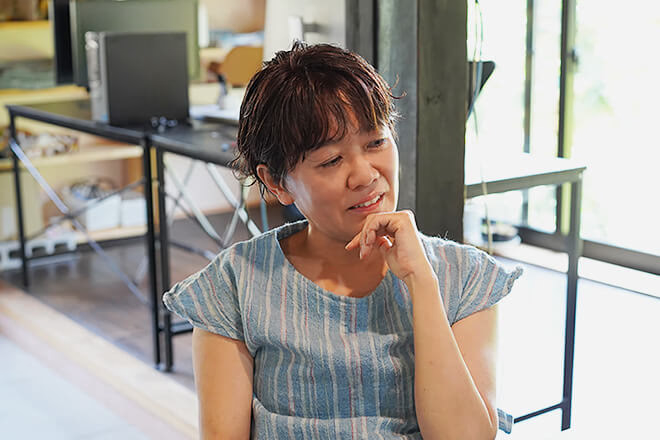
永井 27歳くらいです。そのとき「私、何をやりたいのかな?」と考えていて、映画や駅広告の看板を手描きする仕事っていいなと思いました。アートと職人の間くらいの仕事って何があるかなと考えて、デザイナーになろうとしたんです。広告系DTPスクールで半年勉強してから就職活動をしたけれど、未経験者を採用してくれる会社はあまりなくて。「そろそろ貯金も尽きるし働かないと」と焦りはじめた頃、「Webだったらデザインもできるから」と言われて、Web業界に入りました。
ただ、ちょっと騙されたような感じもあって(笑)。デザイナーとして入ったはずが、結局プログラマをすることになりました。会社としては私のプログラマとしての知識や経験が欲しかったんですね。そして4〜5年が経ち、プログラマのリーダーみたいな立場になった頃にネットバブルがはじけて、勤め先でもキーマンだった人が急に辞めて仕事が立ち行かなくなったり、辞めさせられる人も出たりのドタバタが続きました。私も会社の仕事がほとんどなくなってしまって退職しました。
悲しみを紛らわせるために会社を立ち上げる
ー 最初のうち、Web業界は永井さんになかなかの塩対応だったんですね。
永井 ねえ?そしたら、同じ時期に会社を去った、デザイナーのリーダーみたいな人と営業のリーダーみたいな人に「一緒に会社つくらない?」と言われて。やることもないから、一緒に会社をつくることにしました。ところが、立ち上げて2年後、週末の社員旅行を楽しんで出社した月曜の朝、社長に呼ばれて「もう来ないでほしい」ってバッサリ切られたんです。私も創業メンバーだったのに、「考え方が合わない」と社長が判断したみたいで。
青天の霹靂だったし、前職を辞めなければならなくなったときよりずっとショックが大きかった。しかも、その半年くらい前に「仕事をもっとがんばりたい」という理由で離婚していたんですよ。ほんとに、梯子を外されちゃった感じでした。忘れもしない、2004年の出来事です。
ー えっと、ちょうど33歳だから女の厄年ですね……。今、振り返ってみると、いろんな人生の危機があったと思うのですが、このときが最大規模でしょうか。
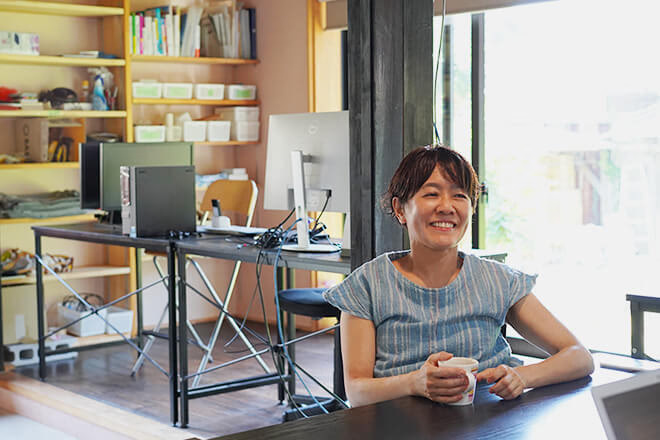
永井 そうかもしれない。そのときは2週間ぐらい、布団から起き上がれないくらいガクンとなっていたんだけど、まあ人間お腹は空くもので。ひととおり落ち込んだ後、悲しみを紛らわせるために何かしようと会社を立ち上げました。今思えば不思議だけど、フリーになるという選択肢がなくて。フリーで働いたことはなかったけれど、会社をつくったことはあったからやり方を知っていたんですね。
ー それがモノサスの前身になった会社ですね。
永井 はい。エイトポイントです。8点だから“発展”しそうだしいいかな、っていうダジャレで(笑)。でも、会社は立ち上げたけれど仕事はないわけで。どうやったら仕事をもらえるのかを考えて、求人情報サイトに注目しました。きっと、人を募集するということは仕事があるんだろうと踏んで、「業務委託で仕事をもらえませんか」と聞いて回りました。ひどかったけどね、仕事の質は。「とにかくやるか」みたいな感じでした。
ー 料金や納期がキツい仕事が多かったということですか?
永井 やっぱり実績も信頼もない会社に発注するのは、お金がなかったりスネに傷をもっている人も多かったですね。そのうち、前々職のゴタゴタで散っていった人たちが「永井さん、会社やってるなら仕事しない?」と言ってくれたりして、少しずつ仕事を増やしていきました。
モノサス結成秘話「大井町のスタバで聞いた熱い思い」
ー 林さん(モノサスの社長)とはいつ出会ったんですか?
永井 エイトポイントを立ち上げてわりとすぐだったかな。人の紹介で知り合いました。第一印象は「何をしゃべっているのか理解できない人」(笑)。業界が違いすぎて、打ち合わせに一緒に行っても、「たしかに日本語をしゃべってはいるけど、何についてしゃべっているのかわからないな」と思っていました。
ー 当時は林さんも、レブ・マーケティングという会社をやっていたんですよね。どうしてふたりはお互いの会社を合併してモノサスをつくることになったんですか?
永井 林さんの会社は制作部門がなかったので、制作できる人がいいなという考えがあったと思います。私は、どちらかというとマーケティングや仕事を取るところが弱くて。ただ、どんな仕事も受けたら何かしらやれるなという感じがあったので、お互いにメリットになっていたんじゃないかな。あと、私自身も日中に打ち合わせして夜に制作して、また翌日打ち合わせして……というハードな働き方がキツくなってきていました。そろそろ長く続けられる仕事のやり方に変えたいという思いにハマったところがあります。だけど実は、合併後のほうが余計大変だったんだけどね。
ー 誰かと一緒に仕事をするのは、思っているより簡単じゃないことが多いと思います。林さんとは「この人となら一緒にやれそう」というところが何かあったんですか。
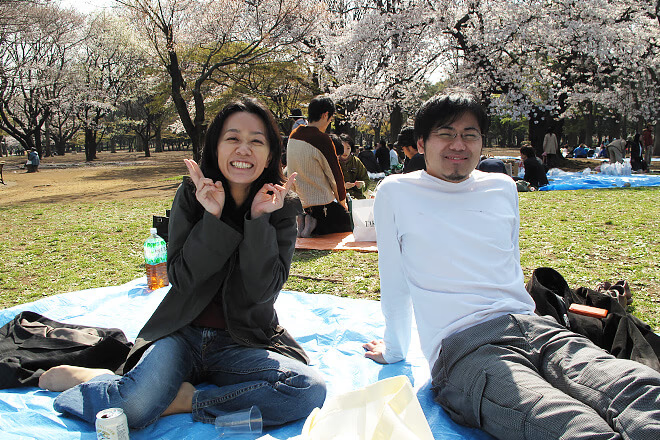
2010年のお花見にて、永井さんと林さん(ちょっと若い)
永井 林さん以前にも、何人かに「一緒にやりませんか」と言われていて、「悪い話ではないけどどうしようかな」と迷っているうちに、なんとなく話が立ち消えになったりしていました。なのになぜ、林さんと一緒にやろうと思ったか……。大井町のスタバで話をして決めた記憶がありますね。
でも、会社を合併するってどういうことだか知らないままに進めてしまったから、いくつか行き違いもあって。最初の5年くらいは存続すること自体が大変だったので「うわー、失敗したかもしれない」と思ったこともありました。いちおうエイトポイントが存続会社というかたちにしたので、正確に言うと社長交代・社名変更というかたちでした。
ー 「他人や世間から与えられたものではなく、モノサシをもつ」、自分たちの活動を「ものさす」という動詞で呼ぶというコンセプトや社名は一緒に考えて決めたのですか。
永井 いや、そこは林さんが決めましたね。私は「どういう会社にしていきたい」というビジョンは正直ないんですよ。「自分のモノサシをもつ会社にしていきたいですよ」「ああ、いいんじゃないですか」って流しちゃうから、林さんも手応えないだろうなと思いますね(笑)。
正解のない道を歩くための「モノサシ」をもつ
ー 昨夜、周防大島メンバーとごはんを食べていたとき、「正解はひとつじゃない。私はこう思うということは言えるけど、あなたが自分で考えてどう思うかが大事だよ」って(酔っ払って)言っていましたよね?私には永井さんが「あなたのモノサシではどうなの?」とメンバーに問いかけているように聞こえました。「林さんが決めた」と言いつつ、永井さん自身も「自分のモノサシをもつ」ことを大事にしていて、メンバーにも共有しようとしているのでは?
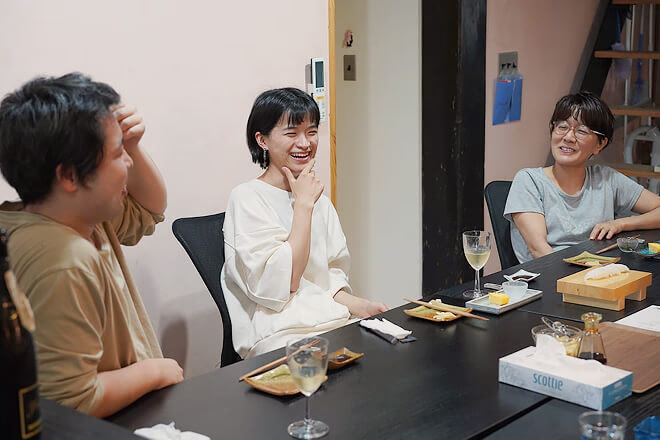
周防大島は夜の外食が少ない代わりに、気軽にお寿司屋さんに来てもらえます。会社でお寿司パーティ。
永井 いいこと言ってますね、私。酔っ払っていたから覚えてないけど(笑)。林さんに感化されているところはあるかもしれません。やっぱり、私も副社長とはいえ中間管理職なので、モノサスがそういう方向に行くなら、メンバーにはことあるごとに伝えたいなというのはあるかな。
実際に、ひとつのやり方があるお客さんにすごくハマったからと言って、次のお客さんにハマるわけではないんです。何十年とWebディレクターをやっていても、一回一回が正解のない道を、「でも、きっとこれがいいはずだ」と信じて突き進むしかないみたいな感じがありますかね。
ー 技術も変わるし、社会のニーズによってWeb業界のトレンドも移り変わっていく。ひとつの答えがいつも通用するわけではないから、自分にとっての最適解を見つけることが大事だよと教えていらっしゃるのかなと思いました。
永井 やっぱり、私自身の生き方がね、世間が「こういう人生が幸せだ」と言う“王道”ではない、自分がいいと思う道をはからずも通ってきていますので。世間的な軸で見ると、離婚したり、一緒に立ち上げた会社の共同経営者からは破門されたりするって可哀想な人生みたいじゃないですか。その頃は、友だちからも「ああ、大変だよね、永井さん」っていう目で見られていました。
でも、はたから見たら大変な状況になっていても、「ま、自分が決めたんだしな」みたいな割り切りがありました。たとえば、子どもを産んで家を買っている友だちがいたら「ああ、よかったね」とは思いますが、私自身はその生活よりも「今の私の生活でよかったな」と思っていた。ただ、王道を行っている友だちから「大変だね」「かわいそうだよね」みたいなことを言われるうちに、つきあう友だちは変わりましたね、やっぱり。
ー みんなが「それでいいじゃん」と言うような、安定した将来が約束された王道を拒んでしまったんですものね。
永井 結果的に、全部捨ててきたみたいなのはあるんですよねぇ。
ー そのとき、オールで大陸の岸壁をドンッと突いて、大海原に出て行った永井さんの姿が見えます。
永井 そんなにかっこよくはない(笑)。「もうダメ。このままじゃもうダメ、やめる!」みたいな感じだったけどね。柵山さん(モノサスの役員)と、「選んだ道と選ばなかった道のどっちが幸せだったかなんて比べられない。決めちゃったからには、選んだ道がなるべく幸せになるように努力をするしかないって感じだよね」となぐさめあってるのが、強がりな本音ですね。
王道じゃない道を選んできた永井さんの人生、この後は周防大島への移住という展開が待っていました。そのあたりは後編でじっくり伺いたいと思います!
